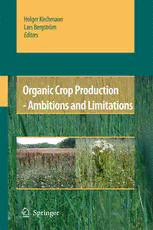
Organic Crop Production – Ambitions and Limitations PDF
Preview Organic Crop Production – Ambitions and Limitations
Organic Crop Production – Ambitions and Limitations · Holger Kirchmann Lars Bergstro¨m Editors Organic Crop Production – Ambitions and Limitations 123 Editors Dr.HolgerKirchmann Dr.LarsBergstro¨m SwedishUniversity SwedishUniversity ofAgriculturalSciences ofAgriculturalSciences Dept.ofSoilandEnvironment Dept.ofSoilandEnvironment P.O.Box7014 P.O.Box7014 SE-75007Uppsala SE-75007Uppsala Sweden Sweden ISBN978-1-4020-9315-9 e-ISBN978-1-4020-9316-6 DOI10.1007/978-1-4020-9316-6 LibraryofCongressControlNumber:2008938183 (cid:2)c SpringerScience+BusinessMediaB.V.2008 Nopartofthisworkmaybereproduced,storedinaretrievalsystem,ortransmitted inanyformorbyanymeans,electronic,mechanical,photocopying,microfilming,recording orotherwise,withoutwrittenpermissionfromthePublisher,withtheexception ofanymaterialsuppliedspecificallyforthepurposeofbeingentered andexecutedonacomputersystem,forexclusiveusebythepurchaserofthework. Printedonacid-freepaper 9 8 7 6 5 4 3 2 1 springer.com Preface Organicagricultureisbeingpromotedagainstabackgroundofintensivediscussions aboutproductionmethods,foodandfeedqualityandrenewableresources,withthe overallaimoflong-termsustainability.Organicagricultureisasubjectthattriggers manydifferentresponsesinpeople.Someareconvincedthatitisthewayforward, whileothersquestionitsbenefitsandthewisdomofitslarge-scaleimplementation. Even among the scientific community, different views have developed over recent decades. Organicagricultureispromotedinanumberofpopularandscientificbooksand isoftendescribedasbeingsuperior,thesolutiontocommonagriculturalproblems andameansofproducingbetterfood.Organicagricultureisoftenviewedasbeing environmentallysoundandsuperiortoconventionalagriculturethroughtheexclu- sion of synthetic fertilisers and pesticides. As a result, any questioning of organic practices is unpopular and criticism is often interpreted as impeding the develop- ment of sustainable systems. In addition, scientifically-based information contra- dictingtheclaimsmadefororganicagriculturecanbedifficulttocommunicateand canberegardedasastepbackwardsandagainstpoliticalmainstreamopinion. The topic was discussed at a Symposium at the 18th World Congress of Soil Science in Philadelphia in 2006, where benefits and problems relating to organic cropproductionwerepresented.Someofthekeyfindingsfromthatsymposiumare presentedinthisbook,togetherwithothercentralaspectsoforganiccropproduc- tion.Theaimofthisbookistoprovidethereaderswithaclear,scientifically-based overviewofanumberofrelevantsubjectsrelatingtoorganiccropproductionsothat theycanformabalancedpictureofthisfoodproductionapproach. Weareverythankfultoallthecontributingauthorsforprovidingtheirin-depth viewsinthevariouschapters.Wewouldalsoliketoacknowledgealltheanonymous reviewerswhohelpedtoimprovethequalityofthedifferentchaptersandDrMary McAfee for excellent linguistic advice. Finally, we would like to thank Springer forpublishingthebook,whichwehopewillprovideabetterunderstandingoftrue long-termsustainabilityinfuturecropproduction. Uppsala,Sweden HolgerKirchmann July2008 LarsBergstro¨m v Contents 1 Widespread Opinions About Organic Agriculture – Are They SupportedbyScientificEvidence? ............................... 1 LarsBergstro¨m,HolgerKirchmannandGudniThorvaldsson 2 FundamentalsofOrganicAgriculture–PastandPresent............ 13 Holger Kirchmann, Gudni Thorvaldsson, Lars Bergstro¨m, Martin Gerzabek,OlofAndre´n,Lars-OlovErikssonandMikaelWinninge 3 CanOrganicCropProductionFeedtheWorld? ................... 39 HolgerKirchmann,LarsBergstro¨m,ThomasKa¨tterer,OlofAndre´n andRuneAndersson 4 PlantNutrientsinOrganicFarming.............................. 73 KeithGoulding,ElizabethStockdaleandChristineWatson 5 NutrientSupplyinOrganicAgriculture–PlantAvailability,Sources andRecycling.................................................. 89 HolgerKirchmann,ThomasKa¨ttererandLarsBergstro¨m 6 Synthesis of the Apelsvoll Cropping System Experiment in Norway–NutrientBalances,UseEfficienciesandLeaching.........117 AudunKorsaethandRagnarEltun 7 Use Efficiency and Leaching of Nutrients in Organic and ConventionalCroppingSystemsinSweden........................143 Lars Bergstro¨m, Holger Kirchmann, Helena Aronsson, Gunnar TorstenssonandLennartMattsson 8 HowWillConversiontoOrganicCerealProductionAffectCarbon StocksinSwedishAgriculturalSoils?.............................161 OlofAndre´n,ThomasKa¨ttererandHolgerKirchmann vii viii Contents 9 EnergyAnalysisofOrganicandConventional AgriculturalSystems ...........................................173 Go¨teBertilsson,HolgerKirchmannandLarsBergstro¨m 10 TheRoleofArbuscularMycorrhizasinOrganicFarming ..........189 MeganH.RyanandMarkTibbett 11 OrganicFoodProductionandItsInfluenceonNaturallyOccurring Toxins ........................................................231 CarlK.Winter Index .............................................................241 Contributors RuneAndersson DepartmentofFoodScience,SwedishUniversityofAgricultural Sciences,P.O.Box7051,SE-75007Uppsala,Sweden OlofAndre´n DepartmentofSoilandEnvironment,SwedishUniversityofAgricul- turalSciences,P.O.Box7014,SE-75007Uppsala,Sweden,[email protected] Helena Aronsson Department of Soil and Environment, Swedish University of AgriculturalSciences,P.O.Box7014,SE-75007Uppsala,Sweden Lars Bergstro¨m Department of Soil and Environment, Swedish University of AgriculturalSciences,P.O.Box7014,SE-75007Uppsala,Sweden, [email protected] Go¨teBertilsson GreengardAB,P.O.Box552,SE-24495Do¨sjebro,Sweden, [email protected] Ragnar Eltun Bioforsk Arable Crops Division, Norwegian Institute for Agricul- turalandEnvironmentalResearch,Apelsvoll,N-2849Kapp,Norway Lars-Olov Eriksson Johannelunds Theological University College, Heidenstam- storg75,SE-75427Uppsala,Sweden MartinGerzabek InstituteofSoilResearch,UniversityofNaturalResourcesand AppliedLifeSciences,Peter-Jordan-Straße82,A-1190Vienna,Austria KeithGoulding Cross-InstituteProgrammeforSustainableSoilFunction,Rotham- stedResearch,Harpenden,Hertfordshire,AL52JQ,UK, [email protected] Thomas Ka¨tterer Department of Soil and Environment, Swedish University of AgriculturalSciences,P.O.Box7014,SE-75007Uppsala,Sweden ix x Contributors Holger Kirchmann Department of Soil and Environment, Swedish University of AgriculturalSciences,P.O.Box7014,SE-75007Uppsala,Sweden, [email protected] Audun Korsaeth Bioforsk Arable Crops Division, Norwegian Institute for Agri- culturalandEnvironmentalResearch,Apelsvoll,N-2849Kapp,Norway, [email protected] Lennart Mattsson Department of Soil and Environment, Swedish University of AgriculturalSciences,P.O.Box7014,SE-75007Uppsala,Sweden Megan H. Ryan School of Plant Biology, University of Western Australia, 35 StirlingHwy,Crawley,WA,Australia,6009,[email protected] Elizabeth Stockdale School of Agriculture Food and Rural Development, King GeorgeVIBuilding,NewcastleUniversity,Newcastle-upon-Tyne,NE17RU,UK MarkTibbett SchoolofEarthandGeographicalSciences,CentreforLandReha- bilitation,UniversityofWesternAustralia,35StirlingHwy,Crawley,WA,Australia, 6009 Gudni Thorvaldsson Agricultural University of Iceland, Keldnaholti, IS-112 Reykjavik,Iceland GunnarTorstensson DepartmentofSoilandEnvironment,SwedishUniversityof AgriculturalSciences,P.O.Box7014,SE-75007Uppsala,Sweden ChristineWatson SACAberdeen,FergusonBuilding,CraibstoneEstate,Aberdeen, AB219YA,UK Mikael Winninge Department of Religious Studies, Umea˚ University, SE-90187 Umea˚,Sweden Carl K. Winter Department of Food Science and Technology, University of CaliforniaDavis,CA95616,USA,[email protected] Chapter1 Widespread Opinions About Organic Agriculture – Are They Supported by Scientific Evidence? LarsBergstro¨m,HolgerKirchmannandGudniThorvaldsson Abstract Organic agriculture ostensibly offers a concept of sustainable practices basedonenvironmentalresponsibility.Itiswidelybelievedthatorganicprinciples basedonnaturalmeansandmethodsareenvironmentallysoundandthussuperiorto systemsbasedonartificialinputs.Thisoverviewsummarisesthemainresultsonor- ganicagricultureandhighlightsrelevantfactsinordertoprovidescientificinformation aboutthepotentialandlimitationsoforganicagriculture.Thetopicsoffoodsecurity andsafety,environmentalquality,systemsustainabilityandenergyconsumptionare addressed.Someofthemainconclusionsarethatorganicagriculturehasconsistently loweryieldsthanconventionalproductionandistherebyalessefficientmethodof landuse;thatenvironmentalproblemscausedbyprocessessuchasnutrientleach- ingarenotreducedbyconversiontoorganiccropproduction;andthatsoilfertility statusandmicrobialbiodiversityarenotimprovedaprioribyorganiccropping.The energyinvestmentforproductionofartificialNfertilisersresultsinafive-toten-fold energyreturnintheformofbiomassandthishighlypositiveenergybalanceneeds tobefullyacknowledged.Thefuturechallengeofdevelopingsustainableformsof agriculturetoprovidesufficientfoodforagrowingworldpopulationwithminimal environmentaldisturbancedeservesourwholeheartedandunbiasedattention. Keywords Carbonsequestration·Energyissues·Foodproduction·Naturaltoxins· Nutrientleaching·Pesticideresidues·Soilfertility 1.1 Introduction Duringthepasttwodecades,organicagriculturehasoftenbeenpresentedasbeing superiortoconventionalproductioninmanyrespects.Thishasledtoawidespread belief among the general public that organic crop production is better and in an ambitiontosatisfythisopinion,politiciansandlegislatorshavestronglypromoted L.Bergstro¨m( ) B DepartmentofSoilandEnvironment,SwedishUniversityofAgriculturalSciences,P.O.Box7014, SE-75007Uppsala,Sweden e-mail:[email protected] H.Kirchmann,L.Bergstro¨m(eds.),OrganicCropProduction–Ambitions 1 andLimitations,DOI10.1007/978-1-4020-9316-6 1, (cid:2)C SpringerScience+BusinessMediaB.V. 2008 2 L.Bergstro¨metal. this type of agriculture. For example, in Sweden the political goal has been to in- crease the area used for organic production to 20% of all arable soils. In addition, organicallyproducedfoodshouldconstitute25%ofthefoodusedinstateschools, hospitalsandresidentialhomesfortheelderly.Themaindrivingforceshavebeen togeneratebenefitsfortheenvironmentandtoimprovefoodquality.Morerecently, impacts on energy consumption, climate change and long-term sustainabilityhave alsobeeninfocus. Buying organically produced food, and thereby supporting all these benefits, creates a feelgood factor for consumers of organically produced food. For many people,organicallyproducedfoodisalwaysbetterevenifitrequireslong-distance transport. However, the question is whether these common opinions circulating in societyaresupportedbythescientificevidence. Theprinciplesoforganicpracticesderivefromnaturalphilosophiesandnotnatu- ralsciences.Adeeperscientifically-basedanalysisoflong-termorganicfieldexperi- ments–whichisthemainfocusofthisbook–givesadifferentpictureofthebenefits generated.However,scientificcomparisonsoforganicandconventionalfarmingare unappealingtosocietysincetheyprovideevidencethatman-madeinventions,such as artificial fertilisers, often lead to production of crops in larger quantities and of goodquality.Thisisincontrasttothecommonbeliefthatweshouldalwaysfollow rulesdeterminedbynature. In this introductory chapter, we present some common opinions about organic agriculture and discuss them briefly in the context of the results presented in the otherchaptersofthisbook.Thefollowingtopicsrelatingtoorganicagricultureare addressed: (cid:2) (cid:2) Foodsecurityandsafety (cid:2) Environmentalquality (cid:2) Systemsustainability Energyconsumption. 1.2 WidespreadOpinionsVersusScientificEvidence 1.2.1 FoodIssues Sincetheintroductionoforganicagricultureinthe1920s,foodqualityissueshave beenaparticularfocus.Oneofthefoundersoforganicagriculture,RudolfSteiner (1924), believed that artificial fertilisers would degenerate agricultural produce to suchanextentthattheywouldnotbefitforhumanconsumptionbytheendofthe 20thcentury.Concernaboutlevelsofyieldonlyenteredtheagendamuchlater. 1.2.1.1 FoodSecurity A general opinion in society is that conversion to organic crop production is fol- lowed by little or no yield reduction and that organic crop production is therefore
